50 years after the land mark show debuted on NBC, its legacy and impact are at risk of fading away just at a time when we need to remember it and be reminded of it more than ever.
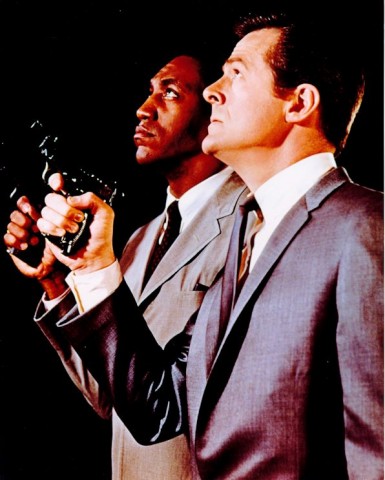
The Legacy of “I Spy.”
“There isn’t one. It’s like we never did it.” – Robert Culp, 2007, when asked about the legacy of I Spy.
The concept hardly causes a stir nowadays. A black man and a white man paired equally as partners and working together as a team is so common place now in films and television that it doesn’t get much of a second glance. Several such partnerships are now iconic and the idea even goes all the way to White House.
But it had to start somewhere and on September 15th, 1965 it did with the premiere of a new spy series on NBC called I Spy. The spy business was everywhere in the mid-60s and was the smoking hot genre of the time. With the westerns and cowboys starting to ride off into the sunset and the success of the James Bond films (starting with Dr. No in 1963) it meant television had a new bandwagon to jump on. And it did starting with shows like Man from UNCLE in 1964.
Actor turned producer Sheldon Leonard (Make Room for Daddy, The Andy Griffith Show) had a different idea in mind for a spy show. Two guys posing as international tennis star and his trainer go globetrotting over the world, defeating evil for the good ol’ US of A. Oh, and one of them is black.
It was unheard of. Putting any black actor in a lead role on television, equal to a white, playing an educated and non-subservient role was unheard of prior to I Spy. And it was born at a time when the struggle for civil rights for blacks in the US was starting to turn from a long slow simmer to a boil.
Consider: Civil Rights activist Medgar Evers was shot and killed in June of 1963 and was initially refused entry in a hospital in Jackson, MS because of his race. Martin Luther King Jr’s “I Have a Dream” speech occurred in August of ’63. President Kennedy was assassinated in November of ’63. Race riots erupted in places like Birmingham, Alabama, St. Augustine, FL, Chicago, Philadelphia and New York City, prompted in part by the passage of the Civil Rights Act in 1964 that banned discrimination based on race, color, religion, sex or national origin. Dismantling of Jim Crow laws in efforts toward desegregation of schools, busing, and restaurants began. Controversial activist Malcolm X was gunned down in February of ’65. The march from Selma to Montgomery AL took place in March and the Voting Rights Act of 1965 was passed in August with the Watts Riots in Los Angeles occurring just days later.
Against such a background of violence and struggle for civil rights in America, television was about to take a chance to show what equality could truly look like. The show was talked about frequently in the media for a solid year before its debut. Television observers and commentators pondered how the show would do, and how many Southern affiliates of NBC would carry it. Columnist William White proclaimed simply that “NBC has guts.”
I Spy was, to say, A Big Deal.
As the show was talked about, so was its stars. Robert Culp was already a seasoned television veteran having starred in the western series Trackdown a few years before and did notable guest spots on shows such as The Outer Limits, Rawhide, Bonanza, The Rifleman, The Virginian, The Man from UNCLE and Gunsmoke just to name a few. He had also began appearing in feature films starting in 1963 with PT 109 with Cliff Robertson and Sunday in New York with Jane Fonda.
Bill Cosby, on the other hand, had no previous acting experience at all. A stand-up comedian, Cosby began to be noticed around late 1963, after playing various clubs and venues and ending up on The Jack Paar Show and The Tonight Show in 1964. Although he was certainly not the first black entertainer to be featured on television he seemed an unlikely choice to become the first black actor to have a starring role on television.
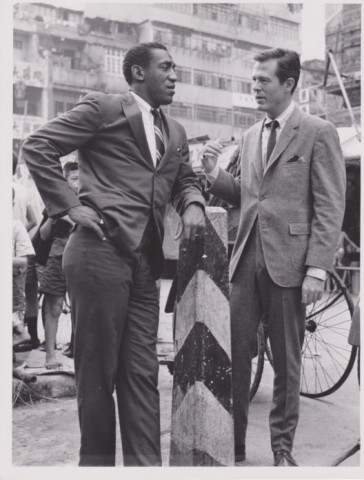 Both performers came to the attention of Sheldon Leonard via different paths but with the same fork in the road – Carl Reiner. Culp had written a script for a pilot for a possible series, a spy themed show that he took to Reiner. Reiner was on his way out of television at the time but had passed the script along to Sheldon Leonard. Leonard liked Culp’s idea, but liked his own better and as soon as Culp heard it, he concurred. Cosby’s name was mentioned to Leonard as having some potential for a future project and then Carl Reiner, again, passed Cosby’s name to Leonard after his son, Rob Reiner, saw Cosby on the Tonight Show and mentioned it to his father.
Both performers came to the attention of Sheldon Leonard via different paths but with the same fork in the road – Carl Reiner. Culp had written a script for a pilot for a possible series, a spy themed show that he took to Reiner. Reiner was on his way out of television at the time but had passed the script along to Sheldon Leonard. Leonard liked Culp’s idea, but liked his own better and as soon as Culp heard it, he concurred. Cosby’s name was mentioned to Leonard as having some potential for a future project and then Carl Reiner, again, passed Cosby’s name to Leonard after his son, Rob Reiner, saw Cosby on the Tonight Show and mentioned it to his father.
Culp was on board to play Kelly Robinson and Leonard offered the role of Alexander Scott to Cosby. The first time Culp and Cosby met and read from the script, it went terribly. Cosby was ill at ease. But there was an immediate connection between the two men, one that would overcome Cosby’s shortcomings as an actor. Culp believed they could make it work, as did Leonard and they managed to convince NBC to carry through with the show, even after the weak “test film” episode “Affair in T’sien Cha” was screened.
Even when NBC wanted to fire Cosby because they didn’t think he was right for the show.
Even when they were afraid to lose the South in terms of viewers.
Even when they were concerned about showing a black man and a white man sharing a room and a wash basin.
It’s the nuances such as that, the scenes showing a black man and white man sharing a table in a restaurant, sharing a hotel room, sharing a bus seat, sharing a car, that we take for granted now, that formed the core of what is I Spy’s legacy. Even more than that it was true friendship and brotherhood that the two characters shared. Kelly Robinson and Alexander Scott had each other’s backs and each had their own individual strengths and weaknesses, complimentary abilities that made the working partnership work.
I Spy didn’t go out of its way to draw attention to racial issues or the turmoil going on at the time. This was not to say that racial issues were ignored. There were never racist jokes or any issues of race between the two leads. But it wasn’t unusual in some episodes for the two to cross paths with someone who would say something that was of a racist nature.
For example, in the episode “Danny Was a Million Laughs,” Martin Landeau plays Danny, a mobster and total jerk of character who at one point turns to Scotty and flips him a quarter. “Here boy,” he says, “I’ll leave my shoes outside the door, you can shine them for me.” Scotty and Kelly essentially ignore this gesture but it’s clear through the episode that they have no use for Danny. Karma gets it due from Danny later in the episode.
Sometimes plots would focus on attempts to split the two partners apart, by any means necessary to undermine their equal status. In the episode “Tonia” from the second season, Leslie Uggams plays an American born black woman who grew up in Italy and has become very leftist in her views. After meeting Scotty, she says she knows what the conditions are in the United States as far as minorities are concerned and she assumes Scotty is subservient to Kelly, at one point saying to him that he “carries the White man’s rackets.” When Scotty calls her out on defining the “conditions” in the US she speaks propaganda of the “ruthless exploitation of racial minorities.” Scotty adds in the “capitalist warmongers and their Wall Street lackeys” blah blah, having heard this drivel before.
Tonia believes in the rhetoric, until later in the episode when she learns that the party wants Scotty and Kelly both destroyed because they represent “harmony, equality, racial equality. They destroy one of our most important propaganda points!” Her assignment is to set the “black man and the white man at each other’s throats.”
Seeing they operate as equals, however, she rejects the task to destroy them and unfortunately pays for her defiance. The communist leader still attempts to split Kelly and Scott apart but fails.
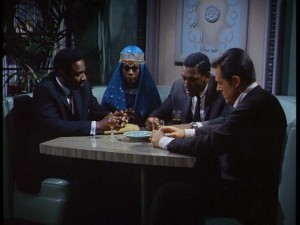 Unhappy with “Affair in T’sien Cha” NBC picked from the other episodes completed the Robert Culp penned “So Long Patrick Henry,” to be the episode that premiered the series. In the episode Elroy Brown, a disenfranchised black American Olympic athlete (played by Ivan Dixon), defects to China lured by the promise of cash. Although he gets more money, he’s kept on a short leash by his Chinese handlers and after a year appears disgusted with the treatment. Kelly and Scotty must make an effort to persuade him to return to the United States. Neither of them really care if Brown comes back to the US or not, since he’s basically a jerk toward both of them. He still thinks he got the better deal until Scott throws it in Brown’s face, telling him bitterly that he more or less sold himself back into slavery.
Unhappy with “Affair in T’sien Cha” NBC picked from the other episodes completed the Robert Culp penned “So Long Patrick Henry,” to be the episode that premiered the series. In the episode Elroy Brown, a disenfranchised black American Olympic athlete (played by Ivan Dixon), defects to China lured by the promise of cash. Although he gets more money, he’s kept on a short leash by his Chinese handlers and after a year appears disgusted with the treatment. Kelly and Scotty must make an effort to persuade him to return to the United States. Neither of them really care if Brown comes back to the US or not, since he’s basically a jerk toward both of them. He still thinks he got the better deal until Scott throws it in Brown’s face, telling him bitterly that he more or less sold himself back into slavery.
Cicely Tyson plays a supporting role as Brown’s love interest, an educated woman from Africa whose grandfather once ruled over tribal lands. At one point in the story, Brown is seen with her during a press conference, advocating for the Afro-Asian Games. He’s asked how he liked Africa. “Yeah, it’s a beautiful country, would make a nice zoo.”
He talks about a town they had visited, the capital, and she pronounces it for him (Ouagadougou, capital of modern day Burkina Faso, in western Africa). He gives a smug snort, saying “Yeah, I wouldn’t say that even if I could.”
No television show before had ever shown storylines involving black performers on this level. Brown’s indifference toward his African heritage along with being flippant and indignant toward everything else was part of the leveling of the playing field in I Spy. Blacks were now seen as good guys, bad guys and everything in between. They could now be seen as independent, educated, hopeful or pessimistic, angry or kind, ruthless or merciful. Amos n’ Andy need not apply.
At this distance in history, however, such an approach is underappreciated and often misunderstood. In his September 2014 review of Mark Whitaker’s biography of Bill Cosby, New York Times columnist Neil Drumming generalized the series as a “globetrotting fantasy that seemed to ignore the turmoil of the civil rights movement.” This is the only nod to I Spy Mr. Drumming could afford in his review of the book, instead giving more weight and importance to the show he called “the one that forever altered television,” The Cosby Show.
If The Cosby Show forever altered television, dare it be said that it was I Spy that kicked the door down first? The real irony in Mr. Drumming’s assessment is that The Cosby Show, although revered for its positive portrayal of an African-American family, was also panned by some as not being “realistic.” I Spy is revered for its positive image of a black man and white man on equal status, yet in the case of Mr. Drumming, it’s panned for being “fantasy.”
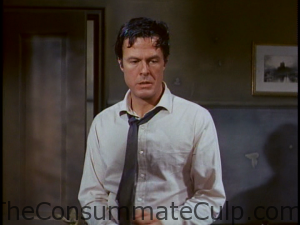 Ok, some of the storylines may have been fanciful, after all this IS television we’re talking about. But I Spy, unlike its various counterparts at the time, didn’t rely on gimmicks, trick weaponry or a Massive Evil Conglomerate Organization Bent on Taking Over the World (Megalomaniacs R Us) as it’s one and only enemy. Kelly and Scotty matched wits and outwitted standard Cold War adversaries from the Russians and the Red Chinese, but also drug lords, mobsters and a few old friends and acquaintances. When either of them were betrayed by somebody, you felt the shock and pain. When either of them were cut, they bled. They were beaten and battered and sometimes bordered on being broken. The spy business was dirty, ruthless, lonely and unforgiving. Innocents were killed while the guilty got asylum.
Ok, some of the storylines may have been fanciful, after all this IS television we’re talking about. But I Spy, unlike its various counterparts at the time, didn’t rely on gimmicks, trick weaponry or a Massive Evil Conglomerate Organization Bent on Taking Over the World (Megalomaniacs R Us) as it’s one and only enemy. Kelly and Scotty matched wits and outwitted standard Cold War adversaries from the Russians and the Red Chinese, but also drug lords, mobsters and a few old friends and acquaintances. When either of them were betrayed by somebody, you felt the shock and pain. When either of them were cut, they bled. They were beaten and battered and sometimes bordered on being broken. The spy business was dirty, ruthless, lonely and unforgiving. Innocents were killed while the guilty got asylum.
That’s not fantasy. That’s real.
And the relationship between the partners, equal and unprejudiced, was real. Robert Culp summed it up best in an article in Newsweek from January 1966 when he said, “We’re two guys who don’t know the difference between a colored and White. That’s doing more than 100 marches. We’re showing what it could be like if there had been no hate.”
No hate.
Fifty years later, America is still wondering what it could be like if there was no hate. We’re so far removed now from the “separate but equal” status of the time, that the visuals of I Spy and of the two characters sharing a meal, a seat, or a mere space within the world, just seem normal and common to us today. What’s unsettling is that I Spy shows us how much further we still need to go and we’re not bothering to look at it now. Even sadder, the revelation of Cosby’s decades of misconduct has caused people to turn away from the show or for those who’ve never seen it to not give it a chance at all, risking it to be marginalized even further. And yet in light of the recent events, from Ferguson Missouri last August to the Emmanuel AME Church shooting in Charleston SC this past June, how are we ever to achieve the kind of equality so beautifully showcased in I Spy if we allow ourselves to dismiss it, remove it and forget it?
Just Under the Radar
Unfortunately, as 2015 marks the 50th anniversary of I Spy, a show deserving of a celebration, the recognition of the series has always seemed to be lacking in many respects. Robert Culp’s quote from 2007 is a brutally honest assessment of where I Spy has stood within pop culture since the series ended. Although it only ran three years, the show remains fondly remembered by fans but seems to fall just under the radar within popular nostalgia culture.
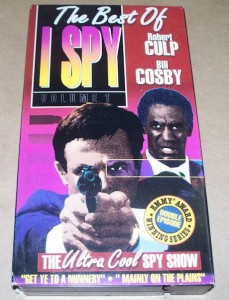 I Spy never cracked the top twenty in ratings but after the show’s end in 1968 it continued to have a decent fan base with reruns running through the 70s and into the 80s. Limited VHS releases came in the 1990s with a random selection of episodes. However, one particular release erroneously featured a photo of Culp and Cosby from their 1972 film Hickey & Boggs on the cover instead of an I Spy photo. I could say how the shortcomings of the internet back then (which just barely existed) wasn’t like the internet now and thus the people responsible for packaging couldn’t double check on the photo…but Hickey & Boggs photos have been erroneously tied to I Spy for years. Still are.
I Spy never cracked the top twenty in ratings but after the show’s end in 1968 it continued to have a decent fan base with reruns running through the 70s and into the 80s. Limited VHS releases came in the 1990s with a random selection of episodes. However, one particular release erroneously featured a photo of Culp and Cosby from their 1972 film Hickey & Boggs on the cover instead of an I Spy photo. I could say how the shortcomings of the internet back then (which just barely existed) wasn’t like the internet now and thus the people responsible for packaging couldn’t double check on the photo…but Hickey & Boggs photos have been erroneously tied to I Spy for years. Still are.
A set of DVDs was released in 2002, a somewhat odd collection that packaged various episodes together by filming location (Italy, Hong Kong, Japan, Madrid, ect). A two volume set, called “The Robert Culp Collection” was released the same year and featured all of the episodes written and/or directed by Robert Culp along with Culp providing commentaries. Complete season sets finally arrived in 2008 and included the same commentaries from Robert Culp on the episodes he penned and….that was it. No other extras. In 2014 Timeless Media, in conjunction with Shout! Factory, put out a nicely done Complete Series package but with no re-mastering of the footage and no extras or features.
By contrast the short-lived 1967-69 series “The Mothers-in-Law” has more extras and features on its complete series DVD release. What? You never heard of that show?
Prior to Bill Cosby’s rape and assault allegations snowballing in the fall of 2014, I Spy was running on various classic TV themed networks such as Retro TV, COZI TV and Magic Johnson’s network ASPIRE. Retro TV seemed to run the show consistently, while COZI TV shuffled the show around their schedule eventually dumping it in a 1am time slot. Depending on your cable provider, this prime viewing time is usually reserved for infomercials so it’s likely you’d have never seen I Spy. Even when the show ran at a more decent hour, 6pm on Friday nights, it doesn’t appear the show was ever promoted by the network. At least, I never saw a promo for it when I watched shows on COZI. ASPRIE and COZI have since dropped I Spy all together and Retro TV still has a page on their website for I Spy but do not have the show listed anywhere on their broadcast schedule. At the time of this writing, the only place you can watch I Spy either online or on television is at Hulu.com.
Most of the online DVD reviews of the box set in 2014 waxed on poetic about the chemistry between Culp and Cosby, the banter between them, the fact that much of the show as filmed on location in different parts of the world and its place in television history, but were otherwise ho hum on the content of the episodes themselves. One reviewer stated “the series is slow and plodding by today’s standards. Many of the 50-minute episodes on the DVD collection can feel excruciatingly long and sluggish.”
Considering today’s “standards” that statement is partly true. Which is a shame really. Some episodes of I Spy require the viewer to be involved with the story, something that perhaps audiences today just can’t be bothered with. They would rather have less talk and more action, explosions, gun fire, gory deaths, quick cuts, split screens, constantly moving cameras, dark and murky settings and wooden acting.
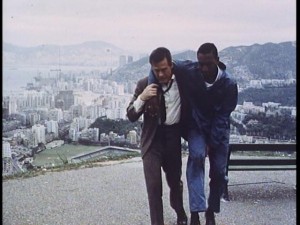 Which may explain why I Spy seems to fly under the radar as far as nostalgic pop culture. Cosby’s misdeeds certainly don’t help now either but the show doesn’t deserve to be punished further. Maybe it’s asking too much too soon but I Spy still matters. It showed us how it looks with no hate. Something we need to see more of, not less.
Which may explain why I Spy seems to fly under the radar as far as nostalgic pop culture. Cosby’s misdeeds certainly don’t help now either but the show doesn’t deserve to be punished further. Maybe it’s asking too much too soon but I Spy still matters. It showed us how it looks with no hate. Something we need to see more of, not less.
~Lisa Philbrick
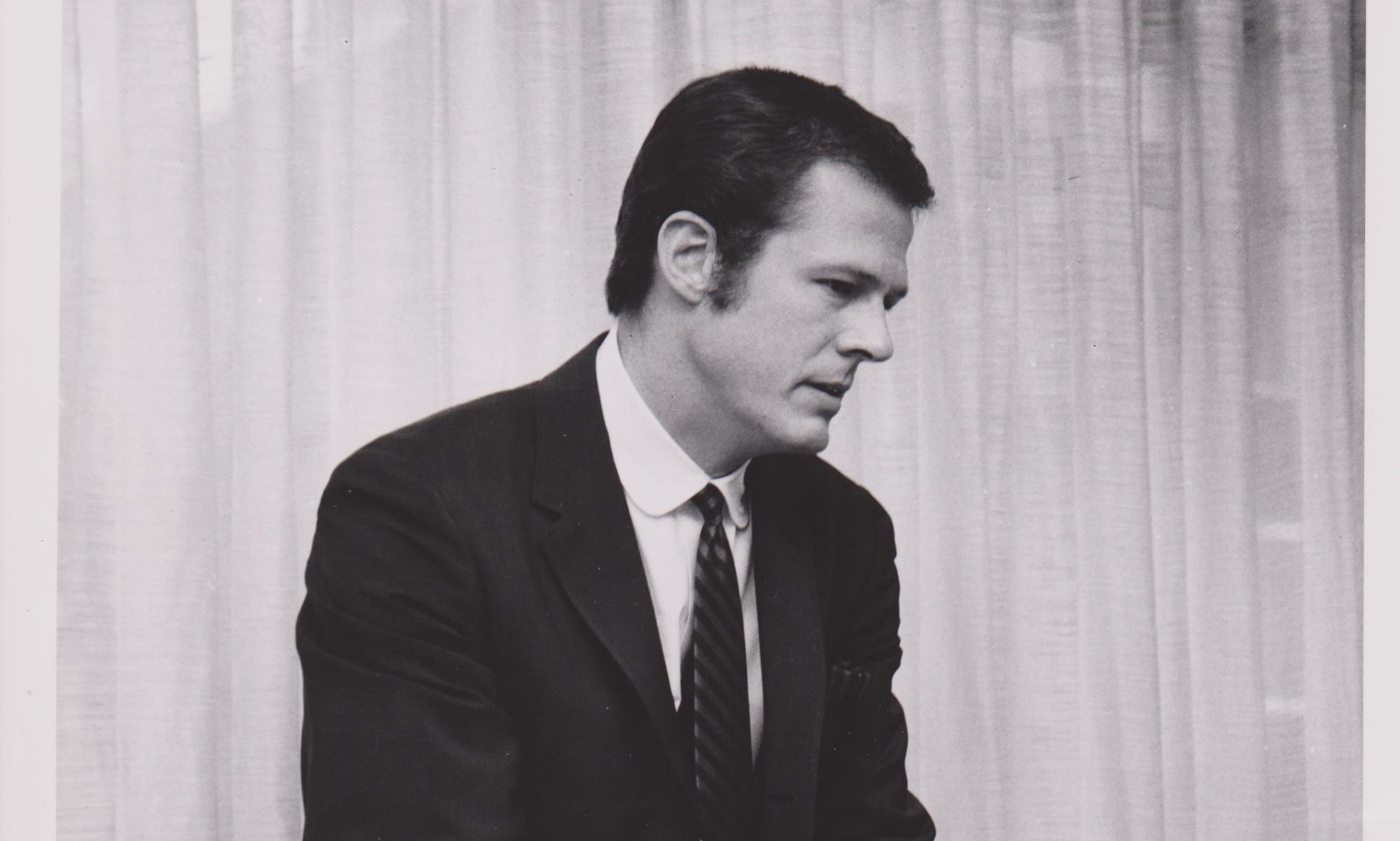

Wish to say “thank you” to Lisa Philbrick for delivering a thought provoking analysis of a favorite childhood show. She is correct that we need to see a team of equals with “no hate”, as often as is humanly possible. Great article. Again, thanks.
Beautifully written and the best assessment of a great tv show I can ever remember reading. Thank you, Lisa.
Thank you for the comments. 🙂
[…] with him. I SPY was a ground breaking culturally significant milestone in television history that still matters. You can try to ignore it and bury it in light of Cosby’s loss of honor because it seems like the […]
I appreciate the thought and care you’ve put into this essay. I like the show and agree with you that fortitude in the face of a depressing range of human evils was an inspiring facet of the show. I had never thought about its place in the social landscape that birthed it though. You’ve given me a greater appreciation for the fact that the folks making the show had to display a little of that ‘fortitude in the face of human evils’ just to get the thing made. I’m grateful for the care that was put into characterizing our heroes… Read more »
I agree totally with everything said about ISpy. I watched it first in 1968 when it aired in Britain & have since watched it over & over on DVD. My daughter & I both agree how incredibly ground breaking it was – the first ‘buddy show’ & most of all the first show with a white man & a black man shown as complete equals – & Scotty was the brains of the pair! A Rhodes scholar no less! In the episode The Spy Game, he gives orders to a white man! I think all those allegations made against Cosby… Read more »